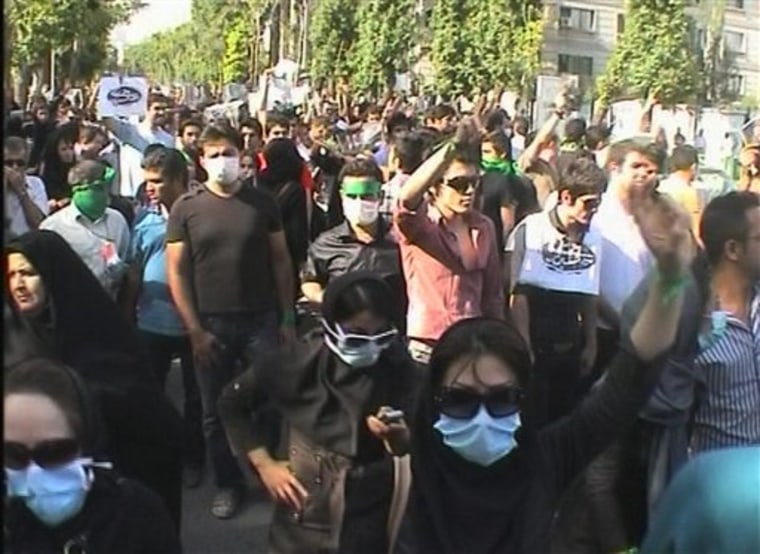It's not just young, liberal rich kids anymore: Whole families, taxi drivers, even conservative women in black chadors are joining Iran's opposition street protests.
They say they want something simple: their votes counted and their voices heard. What they will settle for — or push for — is a far bigger question.
It's still too early to determine if the street protests will morph into a solid political opposition movement led by President Mahmoud Ahmadinejad's top opponent, Mir Hossein Mousavi. And some Iranians have expressed doubt about people's willingness to sustain the momentum.
But in Tehran and other cities throughout the country, Mousavi supporters — from both the upper- and middle-classes — are sending a strong message.
"The government doesn't care about our votes, but we stand behind them. Mousavi stands up for our votes and we follow him," said Saham Boorghani, 26, who is close to Mousavi and an editor at the reformist Web site Iranian Diplomacy.
Boorghani is typical of the young reformists who initially backed Mousavi — but that support is growing to include grandmothers, government employees and hotel clerks.
The last time Iran was engulfed in similar anti-government action was a decade ago when a deadly raid on a Tehran University dorm sparked six days of nationwide protests. At the time, they were considered the worst since the 1979 revolution that toppled the pro-U.S. shah and brought hard-line clerics to power. But the student-driven movement eventually fizzled, leaving many people more bitter but the system intact.
Middle class is flooding the streets
This time, though, the protesters are not just affluent students and youth. The middle class is also flooding the streets and even conservative religious Iranians are joining the Mousavi supporters.
Swathed in a long black chador, 21-year-old Saman Qahremani said she wanted to let the government know that many Iranians from all walks of life are angry.
"When I learned about the result I just felt hatred. They cheated us," said Qajremani, who held a sign at Monday's rally that read in English, "We just want our vote."
"If they do not count the votes of people, Iran will not be a republic any more, it will be a monarchy," she said.
Her friend, also dressed in a chador, nodded in agreement.
Municipal worker Reza Hosseini, 37, cheered for Mousavi as he passed through the rally in a convoy of cars.
"I voted for Mousavi in hope of a better life, more freedom, security and relief," said Hosseini, who wore a button-down shirt with stripes in Mousavi's signature color, green. "All the people I knew voted for Mousavi."
Nearby, a taxi driver shouted out his window: "Everybody should join! Don't just watch, join!"
Could not sit at home any longer
A mother and her daughter, making their way through the crowd of thousands, said they had come because they could not sit at home anymore and watch what was happening.
"This (the Mousavi opposition) is completely different to 1999. That was between the students and the government. This is between the people and the government. This time it is all of Iran. This is a historic movement," Boorghani said.
At Monday's rally, floods of people descended on Mousavi's convoy as it made its way through the crowd. Middle-aged men in crisp button-down shirts climbed over green metal fences or atop buses to try to get a better look.
An elderly couple walked hand-in-hand holding tiny green flags — the color of Mousavi's "Green Wave" campaign. A group of teenagers wearing bright green bandanas flashed the V-for-victory signs while marching down the street.
"I have come to tell the government I am not stupid. I know what they did with my vote," said one of the teens, Amir Ebrahimi, as chants of "Long live Mousavi!" went up around him.
The mass demonstrations of support for Mousavi have spread to other parts of Iran, too. Rallies attracting thousands have popped up across the country including the central historic city of Isfahan, the conservative northeastern city of Mashhad and Shiraz in the south.
'This is a cheater government'
It is not just the election many people in the streets are angry about. They want more personal freedoms and a better economy and international standing. They blame Ahmadinejad for giving Iran a bad name abroad.
"This is a cheater government. In my eyes, Ahmadinejad has defaced himself and Iran," said Leila, a 29-year-old accountant who lives in a middle-class neighborhood of western Tehran and would only give her first name out of fear for her safety.
The last time such a broad base of Iranians took any action against the government was the revolution. The shah's days were numbered when the middle class took up the protest mantle, causing the monarchy to collapse.
But with less than a week after the disputed election, there is no way to know whether this show of force will fade or grow.
Some are skeptical.
Bahman, a 20-year-old mechanics student in central Tehran, said he doesn't think people will stand up to the government over the long-term.
"The government will suppress people easily. People feel alone. There is no support for them while the government enjoys all sort of powers," said Bahman, who gave only his first name because he feared government reprisals.
The government has already taken swift action against protesters and has threatened to crack down harder if the opposition continues. At Monday's rally, hard-line militia opened fire and state TV said at least seven people were killed at the "unauthorized gathering."
"The government may try to strangle us, but we won't sit back and let them," Boorghani said. "There's no way back. We won't give up."
